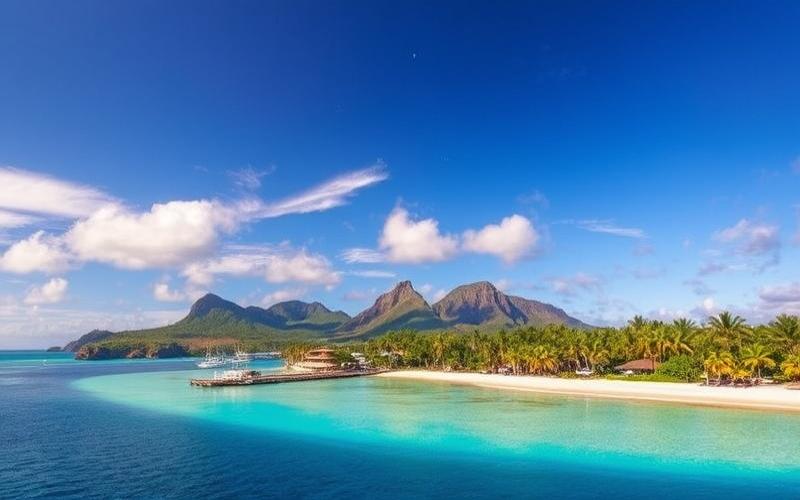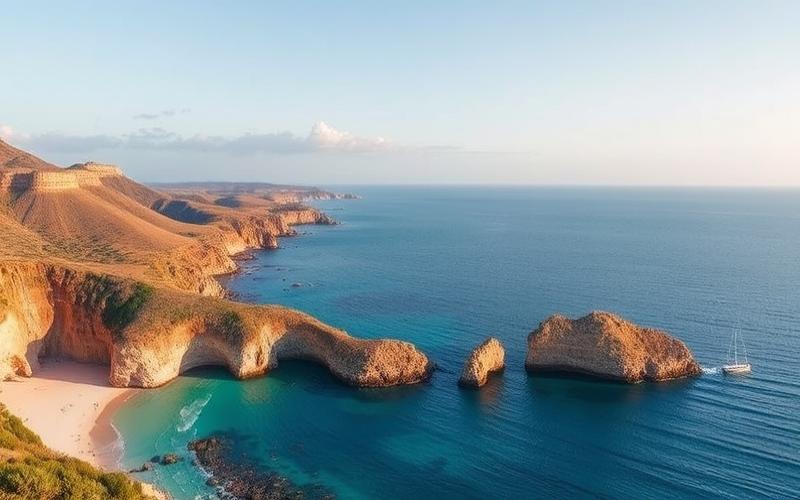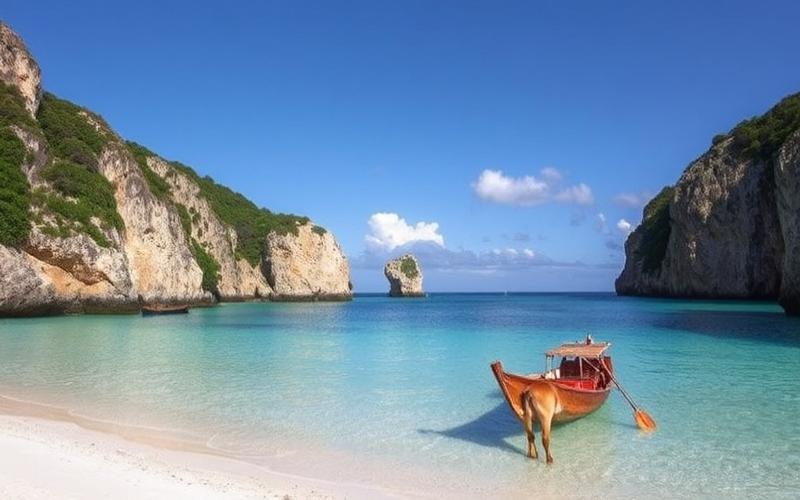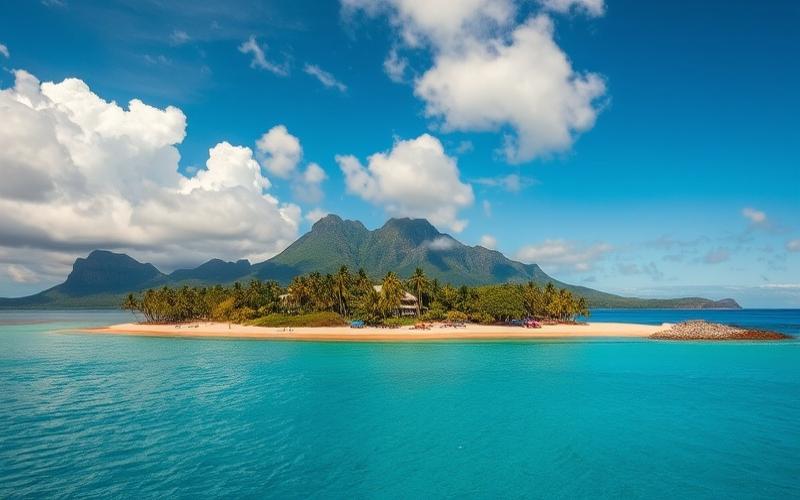
 Published on and written by Cyril Jarnias
Published on and written by Cyril Jarnias
Mauritius has established itself as a prime destination for international real estate investors, offering a particularly advantageous tax framework. In 2025, this small gem of the Indian Ocean continues to attract foreign capital through attractive tax policies and a business-friendly environment. Let’s dive into the details of this tax regime that makes Mauritius a true paradise for real estate investors.
An Attractive Local Tax Regime: The Key to Mauritian Success
Mauritius has successfully implemented a particularly attractive local tax system for real estate investors. This competitive tax regime is one of the pillars of the country’s appeal to foreign capital.
One of the lowest income tax rates in the world
In 2025, Mauritius maintains its income tax rate at a very competitive level. Individuals, whether residents or non-residents, benefit from a fixed tax rate of 15% on their income, including rental income. This uniform and relatively low rate is a major asset for real estate investors seeking to optimize their returns.
For net income up to 650,000 Mauritian rupees (MUR), approximately €13,000, the rate is even reduced to 10%. Beyond this threshold, the 15% rate applies. This simple and advantageous tax structure allows investors to retain a significant portion of their rental income.
Generous tax exemptions
Mauritius goes even further in its tax attractiveness policy by offering several significant exemptions:
– Complete exemption from real estate capital gains tax – No inheritance tax – No real estate wealth tax
These exemptions represent a considerable advantage for real estate investors, allowing them to maximize their gains and transfer their assets without additional tax burden.
Competitive corporate tax
For investors who choose to structure their real estate investments through a Mauritian company, the corporate tax rate is also set at 15%. This uniform and competitive rate applies to company profits, including those from real estate activities.
Furthermore, certain business sectors, particularly those related to exports, can benefit from even more advantageous tax regimes, with rates potentially dropping to 3% under certain conditions.
Good to know:
Mauritius offers a particularly favorable tax environment for real estate investors, with low tax rates and numerous exemptions. This attractive tax policy is a key element of the Mauritian strategy to attract foreign capital and stimulate the real estate sector.
Optimized International Taxation: Mauritius’ Tax Treaty Network
The tax appeal of Mauritius is not limited to its local taxation. The country has developed an extensive network of international tax treaties, thereby strengthening its status as a preferred investment platform.
An extensive tax treaty network
Mauritius has signed double taxation avoidance treaties with more than 40 countries, including many major economies. These agreements cover much of Europe, Africa, Asia, and the Middle East. Among the signatory countries are notably:
– France – United Kingdom – Germany – India – China – South Africa
This vast network of tax treaties offers real estate investors protection against double taxation and increased legal security for their international operations.
Concrete benefits for real estate investors
These tax treaties offer several significant benefits for real estate investors:
– Elimination or reduction of double taxation on rental income – Reduced withholding tax rates on dividends, interest, and royalties – Mechanisms for resolving tax disputes between countries
For example, under the tax treaty between France and Mauritius, real estate income is taxable in the country where the property is located. However, France grants a tax credit equal to the Mauritian tax, thus avoiding double taxation.
A strategic investment platform
Thanks to this network of tax treaties, Mauritius has positioned itself as a strategic investment platform, particularly for investments in Africa and Asia. Investors can use a Mauritian structure to optimize their taxation while benefiting from the protection of tax treaties.
Good to know:
Mauritius’ extensive network of tax treaties offers real estate investors protection against double taxation and international tax optimization. This international dimension strengthens Mauritius’ appeal as a real estate investment destination.
No Property Tax and No Residence Tax: A Major Advantage for Property Owners
One of the most attractive aspects of the Mauritian tax regime for real estate investors is the complete absence of property tax and residence tax. This particularity clearly distinguishes Mauritius from many other countries and represents a considerable financial advantage for property owners.
Substantial savings for property owners
The absence of property tax and residence tax in Mauritius means that property owners do not have to bear these recurring charges that can represent a significant portion of property holding costs in other countries. This exemption applies to all types of real estate properties, whether primary residences, secondary homes, or rental properties.
A competitive advantage for rental investment
For investors entering the rental real estate market, the absence of these taxes represents a significant competitive advantage. It improves investment profitability by reducing fixed costs associated with property ownership. Property owners can thus offer more competitive rents while maintaining an attractive margin.
An attractive factor for foreign residents
This favorable tax policy also helps attract foreign residents, particularly retirees or entrepreneurs, who seek to optimize their tax situation. The absence of property tax and residence tax makes acquiring a residence in Mauritius particularly interesting from a financial perspective.
Administrative simplification
Beyond the financial advantage, the absence of these taxes significantly simplifies administrative procedures for property owners. There are no annual declarations to file or payments to manage, representing time savings and reduced administrative stress.
Good to know:
The absence of property tax and residence tax in Mauritius represents a major financial and administrative advantage for real estate investors. This tax policy helps reduce property holding costs and improve rental investment profitability.
Mauritius vs The World: An Advantageous Tax Comparison
To better understand Mauritius’ tax attractiveness for real estate investors, it’s interesting to compare its tax regime with other popular destinations for real estate investment.
Mauritius vs France: A striking contrast
Comparison with France highlights the significant tax advantages of Mauritius:
- Tax rate on rental income: 15% in Mauritius vs up to 45% in France (plus social charges)
- Property tax and residence tax: Non-existent in Mauritius, can represent several thousand euros per year in France
- Real estate wealth tax: Absent in Mauritius, can reach 1.5% of taxable net value in France
- Real estate capital gains: Exempt in Mauritius, taxed up to 36.2% in France (including social charges)
Mauritius vs Portugal: Two models of tax attractiveness
Portugal, with its non-habitual resident regime, also offers tax advantages, but Mauritius remains more competitive:
- Income tax rate: 15% in Mauritius vs 20% for non-habitual residents in Portugal (for certain types of income)
- Duration of advantageous tax regime: Unlimited in Mauritius vs 10 years in Portugal
- Property tax: Absent in Mauritius, exists in Portugal (although reduced for non-habitual residents)
Mauritius vs Dubai: Two tax havens with different strengths
Dubai is often cited as a tax haven, but Mauritius offers certain advantages:
- Income tax: 15% in Mauritius vs 0% in Dubai
- Political and legal stability: Greater in Mauritius, based on Anglo-Saxon law
- Cost of living: Generally lower in Mauritius than in Dubai
- Tax treaty network: More extensive in Mauritius
Mauritius vs Thailand: The appeal of Southeast Asia
Thailand is a popular destination for real estate investment, but Mauritius offers a more advantageous tax framework:
- Tax rate on rental income: 15% in Mauritius vs up to 35% in Thailand
- Land ownership restrictions: Less strict in Mauritius for foreigners
- Currency stability: The Mauritian rupee is generally more stable than the Thai baht
Good to know:
Compared to other popular destinations for real estate investment, Mauritius stands out with a particularly advantageous tax regime. Its low tax rate, absence of property and residence taxes, and its tax treaty network make it a very attractive option for international investors.
Conclusion: Mauritius, a Strategic Choice for Real Estate Investors
Mauritius is establishing itself as a premier destination for real estate investors seeking tax optimization. Its attractive tax regime, combining low tax rates, numerous exemptions, and the absence of property taxes, offers an environment conducive to real estate investment profitability.
The political and economic stability of the island, its legal framework inspired by Anglo-Saxon law, and its extensive network of international tax treaties further enhance its appeal. These assets allow investors to benefit not only from substantial tax advantages but also from legal security and flexibility for their international operations.
Compared to other popular destinations for real estate investment, Mauritius stands out through the permanence of its tax advantages and the simplicity of its system. Unlike some countries that limit the duration of advantageous tax regimes or impose strict conditions, Mauritius offers a stable and durable framework for investors.
However, it’s important to note that the choice to invest in Mauritius should not be based solely on tax advantages. Investors must also consider other factors such as the growth potential of the local real estate market, quality of life, infrastructure, and the island’s overall economic prospects.
In conclusion, for real estate investors seeking a destination combining tax advantages, stability, and growth potential, Mauritius represents a strategic option to seriously consider. Its attractive tax regime, combined with a business-friendly environment and exceptional quality of life, makes it a destination of choice for optimizing real estate investments while enjoying a paradise-like living environment.
Disclaimer: The information provided on this website is for informational purposes only and does not constitute financial, legal, or professional advice. We encourage you to consult qualified experts before making any investment, real estate, or expatriation decisions. Although we strive to maintain up-to-date and accurate information, we do not guarantee the completeness, accuracy, or timeliness of the proposed content. As investment and expatriation involve risks, we disclaim any liability for potential losses or damages arising from the use of this site. Your use of this site confirms your acceptance of these terms and your understanding of the associated risks.




























